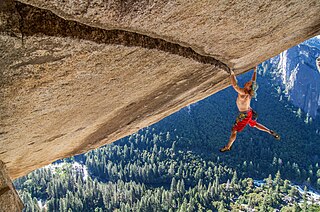
Climbing is the activity of using one's hands, feet, or other parts of the body to ascend a steep topographical object that can range from the world's tallest mountains to small boulders. Climbing is done for locomotion, sporting recreation, for competition, and is also done in trades that rely on ascension, such as construction and military operations. Climbing is done indoors and outdoors, on natural surfaces, and on artificial surfaces

Mountaineering, mountain climbing, or alpinism is a set of outdoor activities that involves ascending mountains. Mountaineering-related activities include traditional outdoor climbing, skiing, and traversing via ferratas that have become sports in their own right. Indoor climbing, sport climbing, and bouldering are also considered variants of mountaineering by some, but are part of a wide group of mountain sports.

Scrambling is a mountaineering term for ascending steep terrain using one's hands to assist in holds and balance. "A scramble" is a related term, denoting terrain that could be ascended in this way. It can be described as being between hiking and rock climbing.

Mountaineering: The Freedom of the Hills is often considered the standard textbook for mountaineering and climbing in North America. The book was first published in 1960 by The Mountaineers of Seattle, Washington. The book was written by a team of over 40 experts in the field.

The British Mountaineering Council (BMC) is the national representative body for England and Wales that exists to protect the freedoms and promote the interests of climbers, hill walkers and mountaineers, including ski-mountaineers. The BMC are also recognised by government as the national governing body for competition climbing.
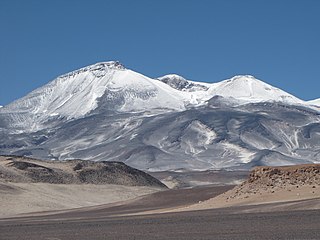
Peak bagging or hill bagging is an activity in which hikers, climbers, and mountaineers attempt to reach a collection of summits, published in the form of a list. This activity has been popularized around the world, with lists such as 100 Peaks of Taiwan, four-thousand footers, 100 Famous Japanese Mountains, the Sacred Mountains of China, the Seven Summits, the Fourteeners of Colorado, and the eight-thousanders becoming the subject of mass public interest.
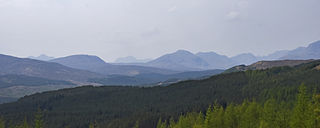
Established in 1889, the Scottish Mountaineering Club is a club for climbing and mountaineering in Scotland.
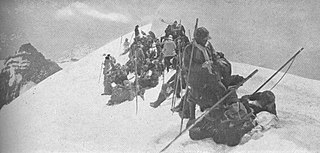
The Mountaineers is an alpine club in the US state of Washington. Founded in 1906, it is organized as an outdoor recreation, education, and conservation 501(c)(3) nonprofit organization, and is based in Seattle, Washington. The club hosts a wide range of outdoor activities, primarily alpine mountain climbing and hikes. The club also hosts classes, training courses, and social events.

The self-arrest is a climbing technique mostly used in mountaineering and alpine climbing where a climber who has fallen and is sliding uncontrollably down a snow or ice-covered slope 'arrests' their fall by themselves by using their ice axe and their crampons.

The Alpine Club of Canada (ACC) is an amateur athletic association with its national office in Canmore, Alberta that has been a focal point for Canadian mountaineering since its founding in 1906. The club was co-founded by Arthur Oliver Wheeler, who served as its first president, and Elizabeth Parker, a journalist for the Manitoba Free Press. Byron Harmon, whose 6500+ photographs of the Canadian Rockies in the early 20th century provide the best glimpse of the area at that time, was official photographer to the club at its founding. The club is the leading organization in Canada devoted to climbing, mountain culture, and issues related to alpine pursuits and ecology. It is also the Canadian regulatory organization for climbing competition, sanctioning local, regional and national events, and assembling, coaching and supporting the national team.
The Irish Mountaineering Club is a mountaineering club whose activities include climbing. The club has over 200 members.
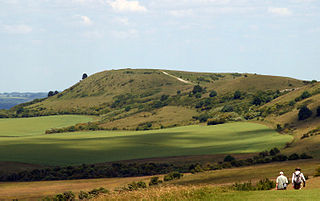
Walking is one of the most popular outdoor recreational activities in the United Kingdom, and within England and Wales there is a comprehensive network of rights of way that permits access to the countryside. Furthermore, access to much uncultivated and unenclosed land has opened up since the enactment of the Countryside and Rights of Way Act 2000. In Scotland the ancient tradition of universal access to land was formally codified under the Land Reform (Scotland) Act 2003. In Northern Ireland, however, there are few rights of way, or other access to land.
The Wayfarers' Club is a senior mountaineering club founded in Liverpool, England, in 1906.
The Lairig Club, commonly referred to as "The Lairig" is the University of Aberdeen’s Mountaineering Club and was founded in the early 1940s. Members take part in a wide range of activities from hillwalking and sport climbing right through to winter climbing, Ski touring and alpinism. Due to the university calendar and its close proximity to reliable venues winter mountaineering is the main focus of the club along with hillwalking. Over the winter season the club prides itself as being one of the most active university mountaineering clubs in the UK and works with the mission statement: "To give the opportunity to participate in, and develop the skills for, safe mountaineering in all conditions." The club has a long and distinguished history painted by famous names such as Tom Patey and Andy Nisbet, two of Scotland's most prolific new routers, who learnt their trade in the Lairig.

In climbing and mountaineering, a traverse is a section of a climbing route where the climber moves laterally, as opposed to in an upward direction. The term has broad application, and its use can range from describing a brief section of lateral movement on a pitch of a climbing route, to large multi-pitch climbing routes that almost entirely consist of lateral movement such as girdle traverses that span the entire rock face of a crag, to mountain traverses that span entire ridges connecting chains of mountain peaks.
Joss Lynam was an Irish civil engineer who was well known as a mountaineer, hillwalker, orienteer, writer and sports administrator. He was one of Ireland's most influential figures in outdoor activities.
The Sierra Peaks Section (SPS) is a mountaineering society within the Angeles Chapter of the Sierra Club that serves to provide mountaineering activities for Sierra Club members in the Sierra Nevada, and to honor mountaineers who have summited Sierra Nevada peaks.

The Ladies' Scottish Climbing Club was founded by Jane Inglis Clark, her daughter Mabel, and Lucy Smith at a boulder near Lix Toll, Perthshire in 1908. It now has about 120 members and is the oldest active climbing club exclusively for women. The club has sent numerous expeditions abroad and made the first all-woman climb of a major peak in the Himalayas.
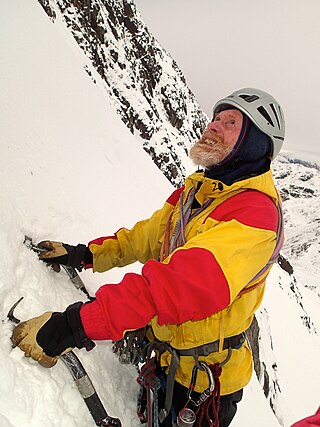
Andrew Nisbet was a Scottish mountaineer, mountain guide, climbing instructor, and editor of climbing guidebooks. Regarded as a pioneer of mixed rock and ice climbing techniques, he built a 45-year reputation as an innovator by developing over 1,000 new winter climbing routes in Scotland, of which 150 were at Grade V, or above.
Mountaineering Ireland is the representative association for hikers and mountaineers on the island of Ireland. It is recognized by both Sport Ireland, the Irish authority for sport, and Sport Northern Ireland, the corresponding authority of the Government of Northern Ireland, thus operating across the island of Ireland. The association has been an International Climbing and Mountaineering Federation (UIAA) member since 2004, as well as a member of other federations. The association is also a publisher of walking and climbing guides.













